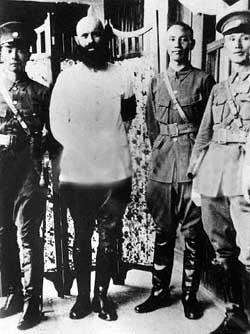Mikhail Borodin
| Mikhail Borodin | |
|---|---|
 1920s portrait of Borodin | |
| Born |
Mikhail Gruzenberg July 9, 1884 Janavičy, Russian Empire |
| Died |
May 29, 1951 (aged 66) Lefortovo Prison, Moscow, USSR |
| Occupation | Comintern agent |
Mikhail Markovich Borodin (Russian: Михаи́л Ма́ркович Бороди́н; July 9, 1884 – May 29, 1951) was the alias of Mikhail Gruzenberg, a prominent Comintern agent, associate of Lenin and Chinese Government advisor to its leader Mao Zedong.
Background
Borodin was born in a Jewish family in Janavičy, Russian Empire, now part of Vitebsk Region, Belarus. He joined the Bolsheviks in 1903 and became an associate of Vladimir Lenin in their underground work. In 1905, he chose to go into exile in the United States. While there, he attended classes at Valparaiso University in Indiana and taught English to immigrant children in Chicago at Jane Addams' Hull House. After the October Revolution of 1917, he returned to his motherland, working in the foreign relations department. From 1919 to 1922, he worked in Mexico, the United States and the United Kingdom as a Comintern agent.[1] He was jailed for six months on 29 August 1922 in Glasgow, ostensibly for breaking immigration regulations, but his political mission was known too and discussed in court.[2]
Mexico
He went as a Comintern agent to the United States. However, he was expelled and sought refuge at Mexico. Prominent Indian revolutionary M. N. Roy gave him shelter. Roy also gave huge financial support to the Comintern through Borodin. Borodin had immense influence in helping Roy transform his views from spiritual to materialistic.
China

When Sun Yat-sen requested the help of the Comintern, Borodin led a contingent of Soviet advisors to Guangzhou, where Sun had established a local government. English was the common language between the two. He negotiated the First United Front between the Kuomindang (Chinese Nationalists) of Sun Yat-Sen and the Chinese Communist Party. Under his tutelage, both parties reorganised on the Leninist principles of democratic centralism and organized training institutes for mass organizations, such as the Peasant Training Institute, where the young Mao Zedong served, and the Whampoa Military Academy, which, under the leadership of Chiang Kai-shek, trained officers for a party controlled army. He arranged shipments of Soviet arms and shrewdly kept a balance between the middle-class elements of the Nationalists and the more radical Communists.[3]
In discussions with Sun Yat-sen, Borodin proposed redistribution of land to peasants. Sun thought that to be premature though desirable in principle and called for rent reductions instead.[4] After Sun’s death in 1925, the growth of a radical peasant movement was encouraged by the Communists but was opposed by many in the Nationalist Party.[5] In April 1927, the Nationalist military leader Chiang Kai-shek initiated a bloody purge of Communists, known as the Shanghai Massacre. Borodin and the Chinese Communists then briefly sided with the left-wing Nationalist government in Wuhan led by Wang Jingwei and Eugene Chen. However, the next month saw further armed Nationalist attacks on Communists and peasant leaders, including in the Wuhan area.[6]
In June 1927, Stalin sent a telegram to the Communists in Wuhan, calling for mobilisation of an army of workers and peasants.[7] That alarmed Wang Jingwei, who decided to break with the Communists and come to terms with Chiang Kai-shek. Borodin returned to the Soviet Union by train in July 1927, accompanied by Sun Yat-sen’s widow Soong Ching-ling.[8] "The revolution extends to the Yangzi River," Borodin told a reporter as they began their journey, and "if a diver were sent down to the bottom of this yellow stream he would rise again with an armful of shattered hopes."[9]
Later life
After his return to the Soviet Union, Borodin worked briefly as editor of the English-language Moscow News. In 1949, he was arrested in the context of antisemitic repressions and died two years later in Lefortovo prison.[10]
Influence
Kenneth Rexroth mentions Borodin in his poem Another Early Morning Exercise, and he is one of the main characters in Les Conquérants, André Malraux's first novel (published in 1928).
References
- ↑ Jonathan D. Spence. The Search for Modern China. (New York: Norton, 3rd, 2013. ISBN 9780393934519), p. 306.
- ↑ 'Foreign Communist Sentenced', The Times, 30 August 1922.
- ↑ Spence, The Search for Modern China, p. 307.
- ↑ Harrison, James Pinckney (1972). The Long March to Power — a History of the Chinese Communist Party, 1921-72. Macmillan. p. 73. ISBN 0333141547.
- ↑ Harrison, The Long March to Power, p. 72-74
- ↑ Harrison, The Long March to Power, p. 108-110
- ↑ Harrison, The Long March to Power, p. 111
- ↑ Harrison, The Long March to Power, p. 115
- ↑ Spence, The Search for Modern China, p. 312, 316-17, 324.
- ↑ Кто вы, Норман Бородин? Следы настоящего Штирлица надо искать в... карагандинских архивах
Further reading
- Jacobs D.N. Borodin. Stalin's Man in China. Stanford Univ. Press, 1985;
- Хейфец Л.С. Латинская Америка в орбите Коминтерна. Опыт биографического словаря. М.: ИЛА РАН, 2001;
- Taibo P.I. II. "Los Bolcheviques. Mexico": J.Mortiz, 1986; Martínez Verdugo A. (ed.) Historia del comunismo mexicano. Mexico: Grijalbo, 1985;
- Jeifets L., Jeifets V., Huber P. La Internacional Comunista y América Latina, 1919-1943. Diccionario biográfico. Ginebra: Instituto de Latinoamérica-Institut pour l'histoire du communisme, 2004;
- Kheyfetz L. and V. Michael Borodin. The First Comintern-emissary to Latin America, The International Newsletter of Historical Studies on Comintern, Communism and Stalinism. Vol.II, 1994/95. №5/6. P.145-149. Vol.III (1996). №7/8. P.184-188.